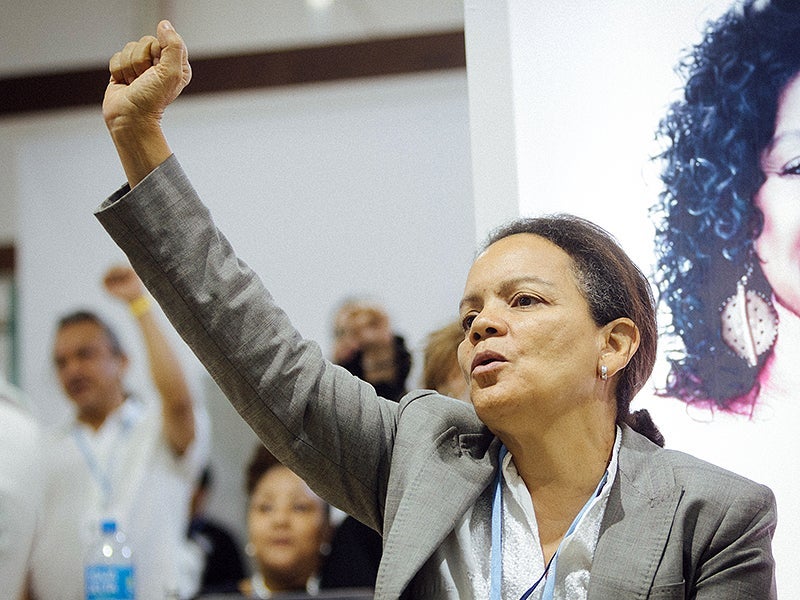Puerto Rico does not need to live in its current state of climate vulnerability. With federal funds, it could end its power grid crisis by installing rooftop solar and battery storage systems for all.
During President Biden’s visit earlier this fall to Ponce, Puerto Rico to survey the damage from Hurricane Fiona, he told a small group of us that he grew up near the fence line of a major polluter in Scranton, Pennsylvania where toxic pollution poured into overburdened nearby communities.
The story Biden revealed in the briefing gave me some hope that he might get the depth of environmental challenges I focus on daily living in Puerto Rico and serving as a member of the White House Environmental Justice Advisory Council. Growing up, I lived not too far from Scranton in Bethlehem, Pennsylvania where I saw blue-collar workers handling red-hot steel rods. Years later, I began to learn that workers like these and communities near them were exposed to dangerous pollution.
Puerto Rican families like mine were among a wave of people pushed out of the archipelago to towns and cities in the 50 states by economic policies that left us desperately in need of livable wages. Now, I live back in Salinas, Puerto Rico, near where a community of mostly Puerto Ricans of African descent are exposed to deadly toxic substances from polluters like the AES coal-fired power plant. We live near aging inefficient power plants that burn residual fuel oil and methane gas to supply electricity to the archipelago.
Part of my role on the environmental justice advisory council is to influence the federal government to focus on environmental injustice challenges and point out solutions, particularly in Puerto Rico. The message I delivered to the president was that Puerto Rico does not have to live with the level of climate vulnerability it currently has. Biden can take action to make a big difference.
Fiona, a Category 1 hurricane when it struck the southwest tip of Puerto Rico, shut down the entire centralized electricity grid, leaving millions without power after transmission lines were damaged. Every time there are severe power outages, lives are lost because medical devices needed to support life fail. Deadly accidents also happen with diesel generators and candles.
Meanwhile, billions of the unspent funds allocated by the Federal Emergency Management Agency for electric grid repair could end these climate-related power crises if Biden ensured the money was used to build rooftop solar and battery storage systems for all residents of Puerto Rico, starting with the most vulnerable. In fact, multiple research studies have concluded that rooftop solar and battery energy systems are the best way to achieve climate resiliency in Puerto Rico. One silver lining of hurricanes Fiona and Ian is seeing real-time proof that communities powered by distributed renewable energy — like rooftop solar, battery storage systems, and microgrids — not only kept their lights on but also power for other life-preserving services, like water, sanitation, and medical facilities.
Homes with rooftop solar and battery storage throughout Puerto Rico, including my own, maintained power during and after the storm. Rooftop solar systems are climate resilient not only because they provide 100% clean energy, but also because they do not depend on vulnerable transmission lines, which are damaged in each major storm.
The Biden Administration holds the key and the purse strings to the necessary transformation of the Puerto Rico electric system. After Hurricane Maria, FEMA allocated more than enough funds to achieve the distributed renewable energy safety net in Puerto Rico, as proposed by civil society groups such as the Queremos Sol (We Want Sun) Coalition. The historic amount of funds already allocated for the electric system has largely been unused.
And, now, Biden has given Secretary of Energy Jennifer Granholm authority to centralize federal resources for grid repair while driving a plan for clean energy transformation. She should make sure the federal funds are only used for a climate-resilient plan that includes a transition to rooftop solar and battery storage systems.
Biden has stated he is committed to climate and environmental justice. What better way to further his agenda in the aftermath of Hurricane Fiona than to use his power to foster a transition to distributed renewable energy in Puerto Rico?
Earthjustice Media Relations Team
media@earthjustice.org
